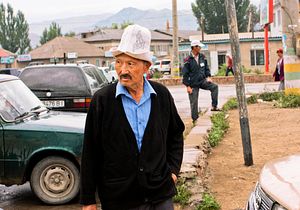The past two months have not been conducive for those seeking to improve the United States’ standing in Muslim-majority nations. From Republican frontrunners Donald Trump and Ted Cruz catering to nativist audiences, to GOP hopefuls like Jeb Bush claiming they would allow entry only to Syrian refugees who can “prove” they are Christians, the electioneering has seen some of the most xenophobic rhetoric the primary cycle has known in some years.
Unfortunately for Central Asian governments, the region has now been roped into the Islamophobic rhetoric circling Syrian refugees and Muslim communities in the United States. Considering how unfamiliar the broader American populace is with Central Asia – such that The New York Times can create a new nation wholesale – it’s not an especially difficult task for certain politicians to link Central Asia to potential threats stemming from Syrian refugees. Nonetheless, the linkage flies in the face of years of lobbying and image-massaging – from Kazakhstan, most especially – to assure American audiences that Central Asia can remain a bastion of secularized Islam.
The notion that Kazakhstan, and broader Central Asia, can stand as an “island of stability” clearly didn’t reach the desk of Senator Rand Paul, another current contender for the Republican nomination for president. Last November, Paul, seeking to buoy his sagging rankings, put forth his “Stop Extremists Coming Under Refugee Entry Act,” shortened to the cutesy acronym SECURE Act. The bill would have barred Washington from approving refugee or asylum applications from some 34 “high risk” countries, including Palestine. Among Paul’s 34 nations were Kazakhstan, Kyrgyzstan, Tajikistan, and Uzbekistan.
For some reason, however, Paul didn’t include Turkmenistan within the ranks of “high risk” nations. (Paul did not respond to requests for clarification on his country selections.) There’s no explicable reason Turkmenistan should have been excluded from the list; it’s not as if Ashgabat maintains an outsized lobbying influence in Washington to scuttle its inclusion, and Turkmenistan’s degrading border security with Afghanistan remains covered. The exclusion – in addition to the base claim that Central Asia presents the same “high risk” as others – casts doubt on Paul’s familiarity with the region.
The bill was soundly rejected – but Central Asia’s inclusion in the list of “high risk” countries lingers. Earlier this month, Nebraska State Senator Bill Kintner introduced a state measure that would, according to the Lincoln Journal-Star, “require resettlement agencies in Nebraska … to prove they can afford to pay up to $25 million if they resettle refugees from” a list of “high risk” countries Kintner has put together. That list, as it happens, is identical to Paul’s – bizarre exclusion of Turkmenistan included. “I took the list that US Senator Rand Paul produced for a bill he introduced,” Kintner told The Diplomat in an emailed statement. “I trust that Senator Paul had they [sic] adequate resources to sort out which counties [sic] have populations that pose significant threats to they [sic] United States.”
To be fair to Paul and Kintner, there is some, however slight, merit regarding concern about Central Asian nationals within the United States. The Boston Bombers both maintained ties to Kyrgyzstan and a pair of Dzhokhar Tsarnaev’s friends sentenced for crimes relating to bombing were from Kazakhstan. Likewise, the trio of New York militants tied to ISIS last year were all Central Asian nationals, and a refugee from Uzbekistan was recently sentenced in Idaho on terrorism-related charges.
But those instances, of course, are few and far between. And any notion that Central Asian states pose an equivalent “high risk” threat as, say, Iraq or Yemen in regards to American citizens is a farce, no matter how many similar bills are proposed – and no matter how many times Ashgabat is strangely excluded.

































